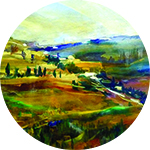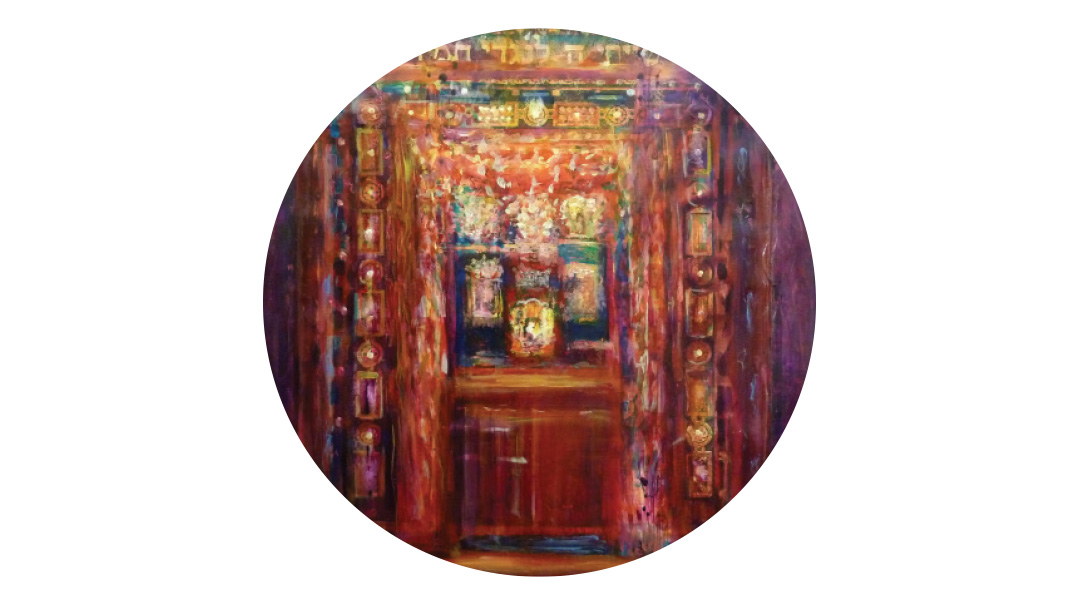Land of Yearning

Our longing for the Land is a yearning for holiness

I’Msitting on an El Al flight listening to the captain introduce himself over the PA system. He rattles off the flight details, then concludes in Hebrew, “and then we’ll be home.”
I relate completely. This summer marks 14 years since the Meichin Mitzadei Gaver led our family to the United States, in Far Rockaway, but Eretz Yisrael will always be home. The thought of not living there still moves me to tears. When I look at the Atlantic, less than a mile from my current residence, I imagine how a long swim would bring me to my real home.
Land of Milk and Honey
We’re entering the time of year when we make an extra effort to feel the absence of the Mikdash, to sense our exile from our Land. What’s different about Eretz Yisrael that Jews throughout the ages have pined to kiss its dust?
It features beautiful mountains and stunning scenery (not to mention the ubiquitous ice coffee on every corner and the fabulous spas), but that isn’t what draws Jews here. Eretz Yisrael is the land where the mitzvos are meant to be kept; it’s here that they’re most pertinent and natural. In fact, this phenomenon goes so far that the pasuk in Vayikra (18:28) exhorts us to stay away from the immoral acts of the nations who lived there before us so that “the Land shall not spit you out.” There’s no other land that has an anthropological response of disgust for errant inhabitants.
Magnetic Pull
In his kuntress Bishvilei Hamoed, Rabbi Peretz Tarshish quotes the pasuk, “Ki ratzu avadeha es avaneha — Because her servants desired her stones” (Tehillim 102). He cautions that our lack of desire for the kedushah of Eretz Yisrael is one of the greatest impediments to bringing the Mikdash back.
As far back as the Dor Dei’ah, the generation in the Midbar, Jews have yearned to come to Eretz Yisrael. The Dor Deiah lived with Clouds of Glory temperature control, a bountiful supply of dreamy mahn, and the purest spring water. But the holiness of the Land exerted its magnetic pull on them.
We know that Moshe Rabbeinu davened 515 tefillos to be allowed to enter the Land, and the Midrash says that he even begged to go in as a bird. Moshe wanted to see Har HaMoriah, he wanted to watch Ein Gedi’s waters fall, he yearned for the cedars of Lebanon, the palm trees of Yericho, the stretches of land traversed by our Avos and Imahos, to breathe in the kedushah that’s ever present in Eretz Yisrael.
Superficial Beauty
I often quote Emmy Leah Zitter’s account of her conversation with her mother, Mrs. Rose Stark a”h, when she brought her to Niagara Falls. She asked her mother if she was impressed, and her mother’s response, “Very nice,” was decidedly noncommittal.
“My mother must have seen the question on my face,” Emmy Leah recounted, “for she went on to explain. ‘You know how you sometimes see a beautiful actress, and you know she’s beautiful, but it doesn’t touch your heart. [At least] not like your daughter’s beauty touches your heart. The beauty I see here is like the beauty in the actress. It’s nice, but it’s not really mine. I’ve been to Eretz Yisrael several times now. When I see beauty in Eretz Yisrael, well, that’s beauty like a daughter’s. I don’t just see it — I feel it. That’s beauty that touches my heart.’ ”
Those who serve HaKadosh Baruch Hu want the Land’s stones. It’s a heart-soul connection. Every day in Far Rockaway my heart echoes what Rav Yehudah HaLevi wrote, “My heart is in the east and I am at the end of the west.”
Rav Pincus calls America a “goyishe wife.” I assume that holds true for any foreign land where Jews mistakenly think they’re at home. He paints a parable of the Jewish groom, out drinking with his non-Jewish bride’s brothers. The moment the alcohol sets in, they start verbally attacking him. “You dirty Jew, what do you think you’re doing marrying our sister?”
Our host lands have lately been renewing the ugly, ancient threat of anti-Semitism. It shouldn’t surprise us. They know we don’t belong there.
Parallel Existence
Our Torah was gifted to us in the desert, and the message is that the Torah can be kept anywhere; its observance isn’t dependent on location. But there’s a reason why Ashkenazic Jews refrain from having the Kohanim go up to duchan except on Yamim Tovim. We are still far from home.
Nevertheless, our longing for the Land is really a yearning for kedushah and fastidious observance of mitzvos, and this is something we can incorporate into our lives wherever we live. The Gemara (Berachos 8) tells us that Rabi Yochanan was surprised when he saw people in Bavel who had merited a long life, though they lived outside of Eretz Yisrael.
“Doesn’t [the pasuk] say ‘So that your life and your children’s lives will be long in the Land that I promised you’?” he wondered.
But his surprise dissipated when he was told, “But here they rise early to learn and daven and stay late.”
He realized that their meticulous mitzvah observance in Bavel created a parallel existence to that of Eretz Yisrael’s, thereby earning them long life.
I call this mindset “Eretz Yisrael glasses.” You can wear them in New York and not wear them in Yerushalayim.
A number of years ago Rabbi Zev Leff visited our shul and shared the following from Midrash Rabbah (Bereishis 39).
Five years before receiving the command of “Lech lecha,” Hashem sent Avraham Avinu on a scouting mission. He visited Charan, where he saw the people frolicking mindlessly. When he stopped in the land of Canaan, though, Avraham saw people eagerly planting trees, and was impressed with their future-oriented ethos. He was then sent back to Aram Naharayim and prohibited from returning to Canaan until receiving the command five years later.
What was the significance of that five-year hiatus? What message does it impart?
Rabbi Leff answered with an explanation from the Shelah Hakadosh: We know that the experiences of our Avos created spiritual DNA for all future generations. The five years Avraham spent waiting to return to Canaan created the yearning for Eretz Yisrael present in every Jew throughout history (though it may sometimes lie dormant).
As a future-oriented people, we must yearn, we must aspire. Wanting the Beis Hamikdash is amazing. Being part of its rebuilding means actively becoming someone who wants what Eretz Yisrael wants: Torah and mitzvos.
Yearning and Earning
In parshas Shelach, we read the tragic story of the Meraglim’s disparaging report of Eretz Yisrael, which stands out in contrast to the cry of the daughters of Tzelafchad in parshas Pinchas.
“Tnu lanu achuzah — We want a portion!” They pleaded with Moshe Rabbeinu to award them a nachalah in Eretz Yisrael, and HaKadosh Baruch Hu acceded to their request.
“Kein dovros, they speak correctly,” He said.
Kli Yakar there mentions that the women’s love for the Land surpasses the love men have for it. He elaborates that the women yearned to take on the mitzvos hateluyos ba’Aretz, the mitzvos that can only be fulfilled in Eretz Yisrael.
It’s no surprise that the Gemara recounts numerous times that in the merit of righteous women, the Geulah came once, and in their merit it will come again.
Let us be those women.
Rebbetzin Aviva Feiner is the rebbetzin of Far Rockaway’s Congregation Kneseth Israel (The White Shul) as well as a mechaneches in TAG and a visiting lecturer at Stern College.
(Originally featured in Family First, Issue 803)
Oops! We could not locate your form.







